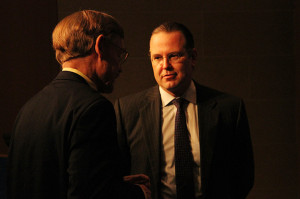
Swedish Finance Minister Anders Borg talks with Robert Zoellick of the Peterson Institute of International Economics, a Washington think tank
(John Burfisher/MNS)
Swedish Finance Minister Anders Borg made it clear Thursday that Europe needs to confront its fiscal problems by accepting more financial austerity to stabilize the economy for the long haul.
His remarks and a subsequent discussion came Thursday with a group of economists from around the globe at the Peterson Institute of Economics, a Washington think tank.
“It’s quite clear you can see arguments for doing fiscal stimulus in 2014 and maybe also 2015,” said Borg. But it is hard to make that case in some European countries, Borg continued.
Sweden’s own challenge, according to Borg, is strengthening its banking system and restoring a structured labor market. But Borg said all of Europe needs to take such steps – not just Sweden.
Sweden has not suffered as severe an economic slump as some other countries in the European Union. The Swedish economy grew 0.8% in 2012, compared to the 0.6% decline in the euro zone, of which Sweden is not a member.
“The main issue in Europe is not about fiscal responsibility in the short run, but rather to create a banking structure that would alleviate the pressure from the credit market.”
Some economists warn that austerity measures in Europe will not help economies over the long run.
The finance minister said that the media scrutinizes Europe because of the severe austerity measures imposed on some countries by the European Union. “I would argue that austerity is necessary for some of the countries,” said Borg.
Borg acknowledged that the United States is different from Europe because of tax rates and a different labor market. Borg agreed that stimulus would be more efficient for the United States because it helps create demand without raising inflation.
“In Europe that’s not the case, you should fix the fundamental problem when you deal with economic policy,” said Borg. “We have to formulate a market with higher labor participation.”
